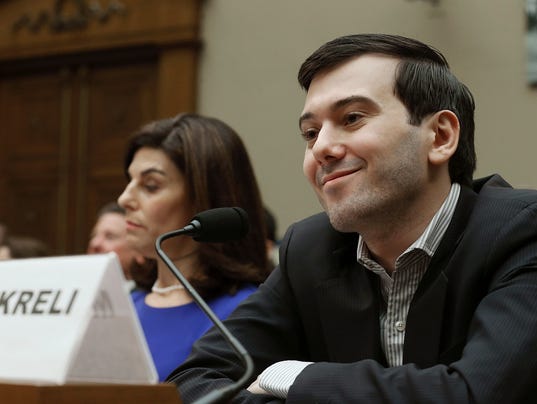
A former vice president of the drugmaker that drew national criticism for raising the price of a parasite-fighting medication by 5,000% testified Thursday he was fired weeks after telling CEO Martin Shkreli the increase "was not justified."
Howard Dorfman, also the former top lawyer for Turing Pharmaceuticals, told a Senate committee he joined managers who told Shkreli and other company officials that hiking the price from $13.50 per pill to $750 per pill "would have a severely negative impact on Turing's business and reputation."
He said Shkreli, who later resigned from Turing and now faces unrelated federal securities fraud charges, rejected the recommendation, saying "no one cares about price increases."
"Mr. Shkreli told me that he was the most knowledgeable person with regard to this business model," Dorfman told the Senate Special Committee on Aging during the panel's second hearing about price spikes on decades-old drugs. "That I was seriously misinformed — despite my 30 years in the industry."
Benjamin Brafman, Shkreli's attorney in the fraud case, declined to comment. Shkreli, 33, who has pleaded not guilty, re-tweeted a reference to hearing testimony that he got no salary while serving as Turing's CEO.
Congressional testimony subpoenaed records show Shkreli led the 2015 price-hike push for Darapim, a drug available since 1953 and considered the standard medication for treating toxoplasmosis. The disease can cause brain and organ damage, and can result in death, for those with weakened immune systems, including patients infected with the AIDS virus, pregnant women and newborns.
The increase, approved even though Turing paid none of the original expense for researching and developing the medication, sparked condemnation from medical caregivers, patients and even some 2016 presidential candidates. The decision also made Shkreli a lightning rod for a national debate about drug pricing and distribution policies.
Shannon Weston told the Senate panel she and husband Joshua looked into seeking a second mortgage in 2015 when told a year's supply of Daraprim to treat toxoplasmosis in their newborn daughter, Isla, would cost $360,000. Their medical insurer declined to pay the bill, she testified.
"I was hopeless and depressed at the thought of what would happen to my perfect little girl if I was not able to help her," said Weston. "I truly felt like I had failed her in the worst possible way."
The couple ultimately managed to secure at least a year's supply of the drug for $200 a month from the University of North Carolina Medical Center's pharmacy, said Weston. Some patients with toxoplasmosis require treatment for a year or more.
Committee members questioned two current Turing executives about the price increase, asking whether they felt the decision was justified.
"It's important to note that we have put in place discounts and support programs that mean ability to pay should never be a barrier to access," said testified Ron Tilles, who succeeded Shkreli as CEO. Two-thirds of Daraprim sales go to federal and state programs "that pay Turing one penny per pill," he added.
Committee Chairwoman Sen. Susan Collins, R-Maine, said Turing is one of several drugmakers that acquired long-established remedies and then imposed steep price increases.
"Whether or not these companies’ actions are legal, their behavior harms patients, represents a market failure, and is a call to action," said Collins.
Sen. Claire McCaskill, D-Mo., the committee's ranking Democrat, said the panel would seek legislative action to ban such drug-pricing policies.
"We're not done," said McCaskill.



